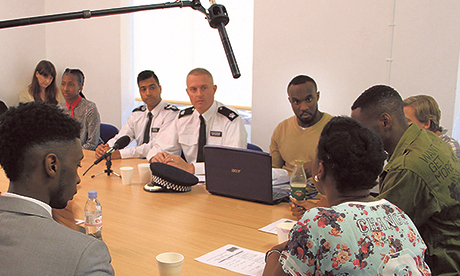Police cuts threaten stop and search progress

Youth worker Deji Adeoshun (right, with laptop) helped to run the monitoring group
Few activities have had a worse effect on the relationship between everyday people and the police than the use and abuse of stop and search powers over the years. But the situation has been turned around in recent years thanks to positive community and police action. If the gains can survive cuts to police funding and the right balance can be struck, Hackney may find it has a success on its hands.
“We’ve gone down in the number of stop and searches in the borough to about 300 a month now,” says Deji Adeoshun, a youth worker at Hackney Centre for Voluntary Service (Hackney CVS).
As well as fewer people being stopped and searched, the proportion of ‘stops’ that are successful – where something is found or an arrest made – has increased, and complaints are down.
Much of the progress has been driven by Hackney Stop and Search Monitoring Group, which is made up of ten young people recruited from across the borough who meet every month with Hackney police chiefs to discuss stop and search tactics and any problems that have come up in their use. The group’s main achievement has been changing the way an individual stop unfolds.
“A lot of people felt like the communication from the police was authoritarian,” recalls Kenny Ladipo, a board member of the Monitoring Group for several years. “They felt they weren’t being communicated with but were being treated as criminals.
“A lot of people felt demeaned by the fact that the police would stop them, not give them an explanation why, rough-handle them and speak wrongly to them. If they didn’t find anything on them the police would not probably offer an apology. So the whole thing was seen as a breach of liberty.”
Ladipo, now in his early twenties, has himself been stopped and searched numerous times. He recounts the worst occasion: “What was funny was that my friend was watching it out the window and when I got into his house he was like ‘did you just see the person who got beaten up by police?’ and I was like ‘that was me.’”
Thanks to the monthly feedback from Ladipo and his colleagues on the Monitoring Group and their analysis of stop and search data, the police realised they had to change.
“We looked at the issues of what was happening,” explains Inspector Richard Galvin, a policeman in Hackney for nine years and closely involved with the group. “What it boiled down to was we weren’t explaining ourselves properly. Officers weren’t telling people – especially the youth – why they were being stopped.”
Galvin’s force now conducts thorough training on how to engage with the community, including making it clear to recruits from other boroughs that, as he stresses: “Not every group of black youths is a gang. They could be just a group of kids playing football.”
Adeoshun and Galvin say that the focus has now moved towards broader community engagement projects, such as the ‘cops in shorts’ initiative: non-uniformed police regularly visiting youth clubs and playing sport with teenagers, including a recent five-a-side tournament held on the
Pembury Estate.
Adeoshun is careful not to relax, concerned that cuts to police budgets could mean fewer officers available for these activities, with some already doing them in their spare time. He also points out that the right balance has not yet been struck.
“Have they gone too far?” Adeoshun asks. “Is it too little now? People are aware that [stop and search] is happening less than it used to.
“Now, with the shootings and knife crime and that sort of stuff happening, people are asking the question ‘is there enough?’”
But if the gains can survive cuts to police funding and a balance can be struck, Hackney may have a success on its hands.
